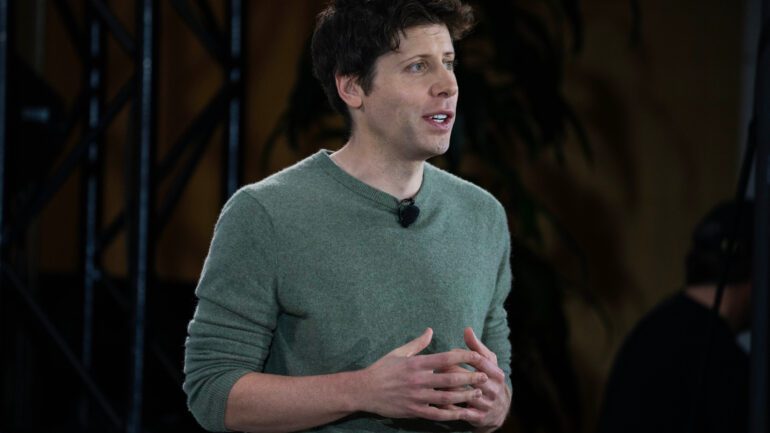TL;DR:
- OpenAI CEO Sam Altman warns that the company may stop operating in the European Union if it cannot comply with new AI legislation.
- Altman has met with EU regulators to discuss the AI Act and has raised concerns about the current wording of the law.
- OpenAI disagrees with the designation of “high-risk” systems in the EU law and argues that its general-purpose AI models are not inherently high-risk.
- Compliance with the EU AI Act’s provisions for high-risk systems is uncertain, and Altman acknowledges technical limitations.
- Altman highlights the risks of AI-generated disinformation but suggests that social media platforms play a bigger role in its dissemination.
- Altman remains optimistic about the benefits of AI technology but acknowledges the need to rethink wealth distribution in an AI-driven future.
- OpenAI plans to publicly address wealth redistribution in 2024, following its ongoing study on universal basic income.
- Altman’s appearance at the University of London attracted protesters who voiced concerns about OpenAI’s vision for the future, particularly related to AGI.
- Altman engages in a conversation with the protesters, understanding their concerns but emphasizing the inseparability of safety and capabilities in AI development.
- OpenAI asserts that it is not participating in an AI race and expresses confidence in its safety measures.
Main AI News:
OpenAI CEO Sam Altman expressed concerns regarding the potential impact of new artificial intelligence legislation in the European Union, stating that his company might consider ceasing operations in the region if compliance becomes impossible. Altman, who has been engaging with EU regulators during his European tour, mentioned having several criticisms of the current wording of the AI Act.
One particular area of contention for OpenAI is the classification of “high-risk” systems outlined in the law. While revisions are still underway, the current version suggests that large AI models such as OpenAI’s ChatGPT and GPT-4 might be designated as “high risk,” thereby requiring the companies behind them to adhere to additional safety regulations. OpenAI has argued that its general-purpose systems do not inherently pose a high risk.
Altman emphasized that OpenAI would make every effort to meet the requirements set forth by the EU AI Act. However, he acknowledged that there are technical limitations that may hinder full compliance. The CEO described the legislation as not fundamentally flawed but emphasized the significance of nuanced details.
During a discussion, Altman expressed his concerns about the risks associated with artificial intelligence, specifically highlighting the potential impact of AI-generated disinformation on individual biases and its influence on the upcoming 2024 U.S. election. Nonetheless, he pointed out that social media platforms play a more significant role in the dissemination of disinformation compared to AI language models.
Despite these concerns, Altman remained optimistic about the overall benefits of technology. He portrayed a positive vision of the future where the advantages of AI far outweigh the risks. Altman’s optimism extended to socioeconomic policy as he contemplated the need for wealth redistribution in an AI-driven future. He acknowledged that wealth distribution would need to be approached differently in the face of technological revolutions.
Altman revealed that OpenAI plans to engage in public discussions about wealth redistribution in 2024, similar to its current involvement in AI regulatory policy. The company is currently conducting a five-year study on universal basic income, set to conclude next year, which Altman believes will be an opportune time to initiate such discussions.
Altman’s appearance at the University of London drew some negative attention from protesters who expressed concerns about OpenAI’s vision for the future, particularly regarding the development of Artificial General Intelligence (AGI). They distributed fliers calling for resistance against Altman’s perceived dangerous perspective and the impact it could have on society.
In response to the protesters, Altman acknowledged their concerns and engaged in a brief conversation with them. Although he understood their worries, he argued that safety and capabilities could not be separated in the development of AI. He also clarified that OpenAI does not see itself as a participant in an AI race, despite apparent indications to the contrary, and expressed confidence in the safety measures they have in place.
Conlcusion:
OpenAI’s potential decision to cease operations in the European Union due to difficulties in complying with new AI legislation could have significant implications for the market. As a prominent player in the AI industry, OpenAI’s absence in the EU market would create a void that competitors may seek to fill. This could lead to increased competition and innovation among AI companies operating within the region, as they vie for market share previously held by OpenAI.
Additionally, the uncertainties surrounding the regulatory landscape and compliance requirements may create a challenging environment for AI companies, prompting them to closely monitor and adapt their strategies to meet evolving regulations. Overall, the outcome of OpenAI’s compliance efforts and its potential impact on the market will be closely watched by industry stakeholders, investors, and policymakers alike.

